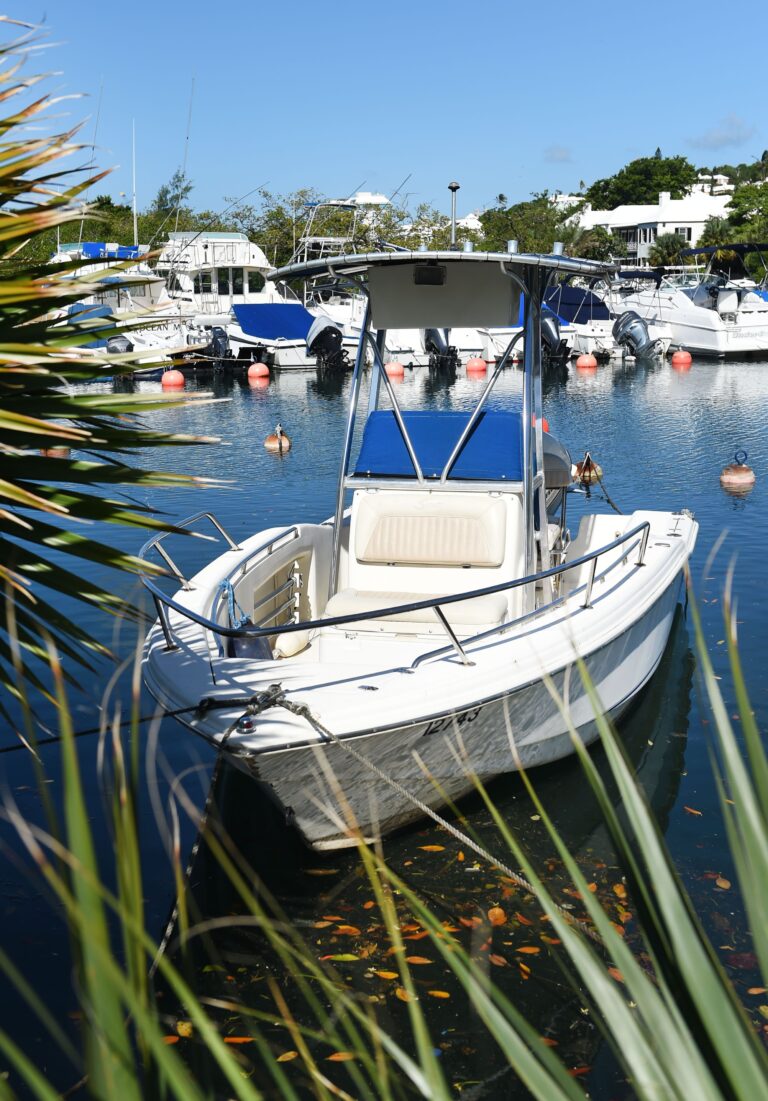Bermuda is only 21 square miles, until you get out onto the water. Then it goes on for as far as your boat will take you. And, once you’re out there, the fun begins. Raft-ups, cruising, wake-boarding, water-skiing, tubing, fishing, snorkelling, diving and exploring. Owning your own boat gives you a platform to enjoy everything our ocean has to offer.
Linda Down is head of boat sales at PW Marine and has spent most of her adult life getting people out onto the water safely, and in a boat they are comfortable with. She talked us through everything you need to know about buying and maintaining the best boat for you.
BUDGET
One of the most common mistakes first-time buyers make is not understanding all the costs and facts before they “dive in”.
If you are looking for a brand-new boat, the lowest starting price, she said, is in the region of $45,000.
That could get you a 13-foot Boston Whaler. “That’s the smallest in our line-up, turnkey,” she added.
Turnkey means the boat is registered, inspected, clean, fuelled-up, has anti-fouling paint on the bottom, the warranties are in effect, and all the safety gear is on board. Literally, all you need to do is turn the key.
In addition to Boston Whalers, PW Marine also sells Pursuit Boats, Tiara Yachts, Valhalla Boatworks Boats, Sea Rays and Viking Yachts, all of which come in a variety of sizes, the largest being the Vikings, which range from 38 up to 90 feet.
If the cost of a brand-new boat is out of reach, you can try the second-hand market. PW Marine can help there too, as long as it’s a boat they know. “We tend to only represent the boats that we service so we know the history of them,” said Ms Down.
While the cost of a pre-owned boat depends on a huge number of factors, particularly age and condition, she estimated that $45,000 could probably get you a 20-foot boat while a second hand 13-foot Boston Whaler could potentially be scooped up for about $20,000.
If you are buying a pre-owned boat directly from the seller, and aren’t familiar with boats yourself, she recommended getting advice from someone who is, “to avoid the headache of buying something that isn’t what it appears to be.”
ONGOING COSTS AND RESPONSIBILITIES
When budgeting for boat ownership, you also need to account for the ongoing maintenance, storage, servicing, registration, insurance and other costs that keep your boat afloat.
Registration: When your boat arrives in Bermuda, or if you buy a second-hand boat, you must register it in your name with the Department of Marine and Ports Services. Registration must be renewed each year, between April 1 and May 31. The fees are determined by the boat’s length.
SERVICING:
Boats have to come out of the water annually to be serviced. At PW Marine, continued Ms Down, “we power wash and repaint the bottom, we do the engine service, we put wax on the sides of the boat. Any customer issues, or things that need to be addressed are done at that time.”
INSURANCE:
Unlike cars, by law, boats don’t have to be insured, but Ms Down highly recommended it, especially if your boat is new. If you keep your boat in a marina, however, she said, “they always have a liability clause so you have to have liability insurance to a certain value in case you damage someone else’s boat.”
Storage: Part of the equation of buying a boat is finding somewhere to keep it. PW Marine has their own marina but, at the time of writing, it was full, with a waiting list. If you are buying a boat from them, Ms Down will reach out to others in the industry to help owners find a good spot:
“To make your boating experience fun, you really want to have easy access to it. It needs to be convenient. If you’ve got to jump on a dinghy and row out three miles to get on your boat, it’s not going to be as convenient.”
HURRICANE PLAN:
Every owner needs a plan for their boat when a hurricane comes. “All marinas will have a mandatory evacuation so you do need somewhere to put the boat,” warned Ms Down. If your boat is moored in protected waters and tied down correctly, that might be OK, as long as another boat doesn’t slam into it. PW Marine offers a hurricane haulage and storage service for their clients.
THE FUN STUFF
Once your budget has been determined, the fun can begin. What size and type of boat are you going to get?
Ms Down’s first question is what the customer’s expectations of boating are and after that she discusses the layout and configuration based on what they want to use it for. “There’s centre consoles, dual consoles, there’s boats with cabins, there’s boats that are set for mostly cruising and recreational. For most of them, you can add on fishing features,” she said. For boats with manageable wakes, a tow bar for water sports is also a fun option.
If you want to go outside the reef, Ms Down recommended a minimum boat size of 20 feet. Some buyers have also chosen to add seakeepers, which, she explained, “stabilise the boat so it takes that rocky motion away.” This is useful when fishing offshore or if you suffer from motion sickness.
Last but not least, every boat needs a name. This can be simple or fun. Maybe you could ‘Seas the Day’ or ‘Sea Ya Later’. The odd ‘Usain Boat’ has also been spotted. If you spent more than you planned, maybe ‘Bankrupt Sea’?
SAFETY
Back to being serious, Bermuda is open water and the weather can turn quickly. Ms Down recommended that anyone new to boating here should take a local boat handling course. These are offered at the Royal Hamilton Amateur Dinghy Club and the Royal Bermuda Yacht Club.

